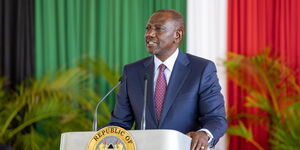Taliban authorities have dissociated themselves from Ksh11 billion worth of black tea being smuggled to Pakistan through Afghanistan.
Pakistan publication The Nation, reporting from Islamabad, stated that Afghan authorities shrugged off accusations from Kenya that the country was benefiting from black tea.
This was despite a 159 per cent spike in smuggled Kenyan black tea to Afghanistan during the fiscal year 2022-23.
Afghan authorities told their Kenyan counterparts that the use of black tea in their country was negligible and attributed the imports to Pakistan businessmen under the guise of Afghanistan Transit Trade (ATT).
Once the tea landed in Afghanistan, it was smuggled back to Pakistan, according to the Afghan authorities.
“They (Afghan authorities) have told Kenya that in Afghanistan no one uses black tea and the jump in the year shows it is smuggled back to Pakistan,” the Islamabad-based press stated.
In what turned out to be a wide smuggling ring, Afghan officials remarked that Pakistan traders were using ATT to evade duties.
Tea destined for Pakistan is illegally transited through Afghanistan, where it is then transported to Pakistan as duty-free goods. The ATT is a bilateral trade agreement between Pakistan and Afghanistan that calls for greater facilitation of goods movement between the two countries.
It covers the movement of Afghan goods - imports, exports and unaccompanied passenger baggage - through Pakistan by rail.
Kenya is incurring losses due to rogue traders smuggling tea to Pakistan through Afghanistan. In the 2021/2022 Financial Year, Kenya exported tea worth Ksh99 billion, but the amount dropped to Ksh88 billion in the subsequent year.
While the demand for Kenyan tea has not wavered in Pakistan, more people are buying the smuggled product.
Back home, Deputy President Rigathi Gachagua embarked on tea and coffee reforms after his inauguration on September 13, 2022. In September last year, Gachagua lauded ongoing reforms in the tea subsector, stating that they were bearing fruit.
He cited improved bonuses for smallholder farmers, with the Gitugi factory in Nyeri paying the highest at Ksh57 per kilo. Imenti in Meru paid Ksh52 and Michimikuru Ksh47.
“We will support you to look for markets for our tea globally. We must look for newer markets internationally because once we get good prices and new markets, the farmers will produce more tea,” Gachagua stated at his official residence in Karen, where he had hosted Kenya Tea Development Agency (KTDA) directors.












